Special forces colonel
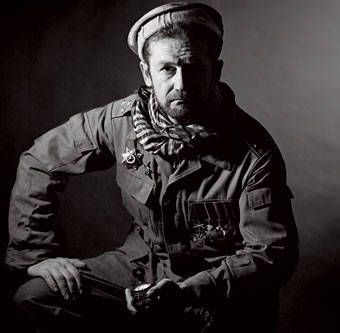 Friends call it the gentle word "Mousik." Yes, and he does not look like a full-grown, past hell of Afgan and Chechnya officer, but as some intelligent Soviet engineer-botanist or elderly skipper from a peaceful fishing trawler (this is because of his beard). In general, not the way a veteran of special forces should look like a man in the street. On the other hand, who should be like that person? On the closed, sullen, suspicious, beaten life of John Rambo?
Friends call it the gentle word "Mousik." Yes, and he does not look like a full-grown, past hell of Afgan and Chechnya officer, but as some intelligent Soviet engineer-botanist or elderly skipper from a peaceful fishing trawler (this is because of his beard). In general, not the way a veteran of special forces should look like a man in the street. On the other hand, who should be like that person? On the closed, sullen, suspicious, beaten life of John Rambo?He is not closed, but very modest. Quiet like that. Taciturn, speaks quietly, if not to say - quietly. Perhaps that is why they listen to him. But the answers to the questions are detailed, the thoughts are formulated intelligibly, with examples, almost literary.
Long-necked, long-necked, with a sharp Adam's apple sticking out over the collar of his shirt. The face is open, the look is straight, honest, gray-blue penetrating eyes, a soft, friendly smile. This civil appearance does not fit in with his past. He even puts on a homely dress - you know, such soft sweaters with a deep neckline, which are put on shirts ...
In general, until I saw him in my photo studio in the Afghan “gerbil”, I couldn’t get used to the idea that this is the very Musik who in 86 participated in the legendary and secret operation “Karera” to destroy the fortified Islamic region. a regiment named after Abdul Wakil, for which the special forces crossed the border with Pakistan and fought there, which for obvious reasons was denied by official Moscow. This quiet shy man thugs caravans of Mujahideen near Jalalabad, imprisoned Emomali Rakhmon on the Tajik throne, supervised work on the creation in Chechnya of the first "ethnic" battalions of special forces of the type "West" and "East". Finally, it was Musienko who led the special forces intelligence service in the operation to destroy Ruslan Gelayev ...
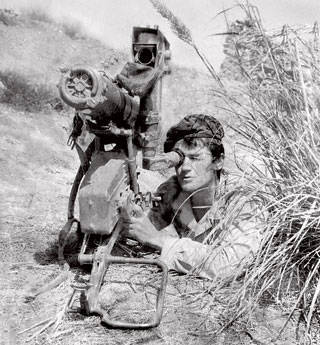
***
Gelayev called Black Eagle. I do not know if he is an eagle, but I treat him with respect - as an adversary with a strong spirit. And he died like that.
The helicopters, on one of which I was in command of the group, handled the slopes of the gorge with a machine gun, suggesting that there might have been firing positions for the militants. Suddenly, the commander of the helicopter crew shouted to me:
- Commander, is it not yours?
- Not! Perfume!
We saw two people climbing up the gorge. We were separated by no more than three hundred meters. I opened fire on them with a machine gun, but the commander of the helicopter crew asked me not to shoot and covered the slope with a volley of 80 mm aviation missiles. The militants were simply boldly off the ridge and overwhelmed by an avalanche. One of these two was Ruslan Gelayev. This was established in February, when his body was dug out from under the snow. In general, death in the mountains ... According to the postmortem report, Gelayev's death was caused by "multiple shrapnel wounds, fractures of limbs and blood loss as a result of traumatic cutting off of the hand."
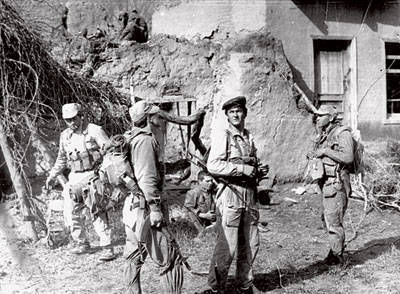
***
But it was the last fight. And began the military biography of Musienko in Afghanistan.
Afghanistan. Start
In the 1985 year, two months before the end of the Kiev VOKU, the highest combined-arms command school, a “buyer” arrived from the GRU and asked me at an interview:
- And if the homeland will send to perform international duty?
I answered:
- I will go with pleasure!
- With pleasure?
- Yes sir! I have been preparing for this for four years!
After graduating from college, I glanced at the prescription and ... immediately realized that it was Afghan. Usually it indicated the position, district, group of troops. I had only three words: “it is at the disposal of TurkVO (Turkestan Military District. -“ RR ”)”. Without details. So in the 21 year I got into the 154-th separate special-purpose squad (OOSPN) of the 15-nd GRU special-purpose brigade. Upon arrival, I was told: “Work calmly. There is no “in the ass heroes”. There are soldiers here. Command them as an officer. ” And on the first ascent, I turned over beds with demobels that did not want to get up for exercises ...
I had no combat experience before Afgan, but I had a good military education. I knew all the equipment, all the weapons: from a pistol to a BMP, I knew the topography, I knew how to navigate in unfamiliar terrain on the map.
In fact, officially in Afghanistan there was no GRU special forces. The word "special forces" was tabooed. We were listed as 1, a separate motorized rifle battalion, but we performed reconnaissance and sabotage tasks in pure form. We hunted for caravans from Pakistan and “killed” them. Personally, I had 96 combat exits in Afghanistan. Every fifth of them was productive.
The first fight is always the worst. My first was in the village of Bagić, 25 kilometers south of Jalalabad. We staged a raid on the Islamic Committee in that village. We had an agent-agent with us, and we decided to cover all field commanders with a sudden raid. In the roar of the propellers Mi-24, which passed over the courtyard, where the “committee members” were sitting, the noise of two “eights” with the troops on board was not heard, and two reconnaissance groups landed safely on the hill above.
The appearance of special forces in the courtyard of the house was completely unexpected for the spirits. The group commander, Zhenya Ovsyannikov, simply jumped off a cliff that was protecting the house from the side of the hill. The scouts immediately proceeded to the "sweep". In that battle, I killed my first spirit: two ran away from the yard, and I filled one with a machine gun. The second managed to leave.
In that battle, we lost the company commander, Captain Alexei Turkov, and the platoon commander, Lieutenant Ovsyannikov. We slept in the neighboring beds. He died immediately.
Then there was the 334 th Asadabad squad. We were called suicide bombers. The detachment was the most difficult area - the area of Kunar, mountainous woodland. I worked there for eight months.
For me, Afghan has remained a holy war. It was the high point of the GRU special forces and the swan song of the Soviet Army. In this war, we did not lose. But they did not win either.
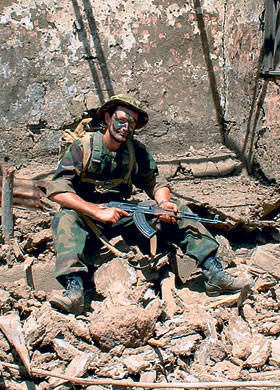
***
Musienko does not say "fought", "fought." He says "worked." This is also the officer's work - to fight and die. And they were dying. The price of the combat experience of the GRU special forces for ten years is eight hundred and seventy-five dead intelligence officers. But the enemy paid dearly for their lives. For each intelligence officer ten or even twenty mojaheds.
Here is a quote from the order of the 40 headquarters of the combined-arms army: “Only in 1987 year did special forces intercept and destroy the 332 caravan with weapons and ammunition, which prevented the leadership of the rebels from supplying more than 290 heavy weapons to the internal provinces of Afghanistan, 80 MANPADS (man-portable air defense system), 30 PURS (missile launchers - Chinese 12-barrel equivalent of the legendary Katyusha. - “PP”) , more than 15 thousand mines, 8 million ammunition. "
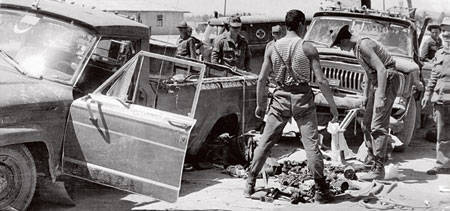
Tajikistan. Second war
Listening to Colonel Musienko, you think: was there a world in his life? Shortly after the end of the Afghan war, he was sent to Nagorno-Karabakh. Three months of war between Armenians and Azerbaijanis. And then there was Tajikistan.
***
In 1991, after the Soviet Union collapsed, the GRU's 15 brigade, where I then served, was “presented” to Uzbekistan. I received the rank of Major by order of the Minister of Defense of Uzbekistan. In the summer of 1992, a civil war broke out in neighboring Tajikistan. The Minister of Defense of Uzbekistan Rustam Akhmedov ordered us to participate in the “restoration of the constitutional system of the Republic of Tajikistan”. A special purpose detachment was formed. I was the chief of staff of this detachment. The composition of the squad - about a hundred people. Most are officers with Afghan experience. By the way, our commander was Vladimir Kvachkov, the one who was tried for the attempt on Chubais.
In Tajikistan, the two warring camps were conditionally divided into "Yurchikov" and "Vovchikov". “Yurchik” were considered those who were for secular power or something else, and “vvchiki” - those who appeared to be in the Islamic opposition, that is, Wahhabis.
However, both camps were recorded not so much by conviction as by place of residence and kinship, and the republic was divided according to the tribal principle. Pamirs, Kulyabians, Karateginians, Gissarians ...
What was going on there! .. On the Shar-Shar pass, we counted thirty victims of Mullah Adjik's gangsters. In one house I saw a corpse of a twelve-year-old raped girl. There were bite marks on her cheeks and neck, a stomach split ... Next to her in the corner lay another dead ball, her six-year-old brother. In the ravine lay the corpse of their mother with the bloomers deflated ... I will not forget
a gravel pit a few kilometers south of Kurgan-Tube, filled with the bodies of shot people from Kulyab, partially gnawed by dogs. In total there were counted more than three hundred and fifty corpses. Cut out everyone, not looking at the floor and age, with whole families and villages.
Our group worked in Kurgan-Tube, and when the main part came back, I stayed in the operational group of the Uzbek General Staff. In order to somehow be legalized, we came up with the name "Popular Front of Tajikistan" (NFT). Our main support was the criminal authority of Sangak Safarov, an elderly man who spent a year in prisons in 21. He was a born leader with excellent organizational skills, a heightened sense of justice and patriotism - he headed the NFT.
It was Sangak who introduced me to Emomalishka, now the President of the Republic, Emomali Rahmon. Then Rahmon was the chairman of the collective farm. Still a picture stands before his eyes: Rakhmon with a huge lyagan (decorative plate. - “PP”) of pilaf and a bottle of vodka is presented to Sangaku on the occasion of his appointment as chairman of the regional executive committee. Later, after the death of Safarov, Emomali from a puppet turned into a local god-president who destroyed all who brought him to power. Someone was planted, someone was buried ...
I was one of the main advisers to Sangak, and later the Minister of the Interior of Tajikistan. We supplied the forces of the NFT with weapons and ammunition, using special methods of the guerrilla war, helped unite everyone who was against the "Vovchikov" and taught them to fight. In fact, the partisan movement in Tajikistan was organized by specialists of the GRU special forces.
Actually, we fought too. It was the special forces officers who planned the operations and were the core of all the landing forces. Vovchikov was driven from January to May and driven into the Pamirs. Successfully landed troops on the dominant heights in the Karategin Valley. By the end of winter, the NNT units of the NFT took the Romitsky fortified battle. Both operations and others were planned by the Russian “Uzbeks” - the special forces of the 1993 th brigade.
There were many minor skirmishes, spontaneous operations, improvisations, in which spetsnaz savvy rescued. I remember well the assault on the ball 11 Nov. 1992 th. The frightened death of Emomali calls me and shouts that in the morning the Vvovchis saddled the pass. Asked for help in general. We took, I will not say where, two battalions, a heavy-duty grenade launcher, an 82-mm mortar, loaded an automatic grenade launcher into the 30-mm UAZ and ... with two dozen fighters went to storm the pass.
We acted like a textbook. Came to the foot, fired at positions from mortar and grenade launchers. Above the grass caught fire, the smoke of a yoke, one of our mines destroyed the house. Already good! And then all of us, twenty fighters and officers, under the cover of a batteer, went to them in a frontal attack. Then the "Vovchik" understood that it was not the "Yurchiki" who were fighting against them, but the Russians, and they fled.
Although we were registered officers of the Uzbek army, but continued to serve Russia. In parallel with the war, we conducted political intelligence - it was thanks to our work that comfortable conditions were created for the transfer of power in the region to politicians with whom Moscow could build normal relations.
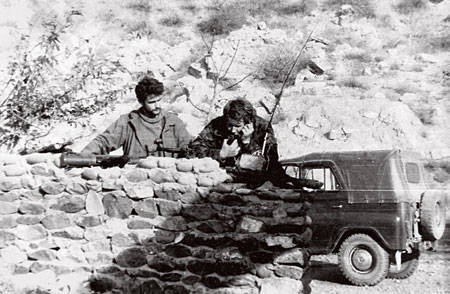
***
In all, the civil war in Tajikistan, which lasted from 1992 to 1997, took 85 000 lives. But the colonel is sure: if there were no Russian special forces there, the bill could go to hundreds of thousands and it is possible that Tajikistan as a state would cease to exist.
Chechnya Ulman's case
After Tajikistan, Colonel Musienko returned to Russia and taught at the Novosibirsk Higher Military Command School at the Special Intelligence Department - he trained officers for units and formations of special forces of the Ministry of Defense of the Russian Federation. It was then that he met Edward Ulman - he was a student in his faculty.
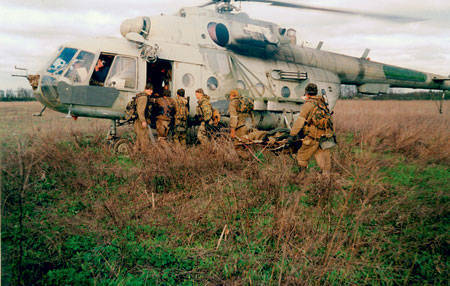
***
In the second Chechnya, I commanded an officer task force that performed special tasks: we hunted down the leaders of the Chechen gangs. Edik was the commander of the reconnaissance group and worked with another of my graduates. I learned from the reports of their names. They had two years of experience and good results in reaching the tasks.
Coincidentally, I witnessed their arrest by the military prosecutor's office and how they were taken from them. In the Intelligence Information and Analytical Center (RIAC) I came across two strangely dressed officers — they were in combat gear, but with empty unloadings without ammunition and without weapons. One of them was Ulman. I asked:
- Since when in RIAC officers disarm?
- Yes, we ... yes of us ... here it is ...
They told exactly what happened. What teams who gave them and what happened then. They, the scouts, had the task of preventing the enemy from breaking through from the area of the special operation. Ulman's scout group was in an ambush on the outskirts of the forest, and when a suspicious car came out on them, they ordered the driver to stop. The order was military-simple - machine-gun fire in front of the machine. But the car did not stop. Then she was shot from several trunks. I know that under similar circumstances, two girls died in another district. I was sitting with them in the car ... Maskhadov. The girls were his cover.
I think that either the driver or the one who was sitting next to him was a fighter who forced the driver not to stop. Then, when the wrecked car was inspected and reported on what happened at the RIAC, Ulman was instructed to leave the area. Before leaving, he helped the wounded! Why would he begin bandaging them, stabbing them with promedol if he intended to finish off the wounded and burn the car? It was then that Ulman was ordered to cover his tracks, and he carried out the order ...
Why could not Edward act differently? Left wounded enemy can show where and in what part the reconnaissance party has left. And this group can be destroyed by the militants.
And then Ulman ... got caught. My conclusion: there is a fact of criminal negligence and illiteracy of the operational duty officer at the RIAC, who gave conflicting orders to the reconnaissance group. And blame the chaos of war. Ulman and the people he killed were unlucky. No one likes to kill innocent people. Then live with this ...
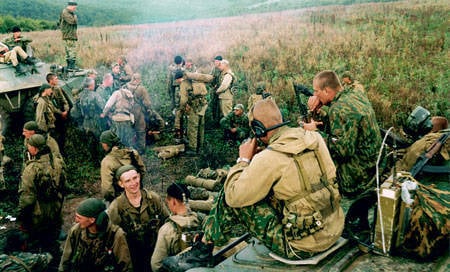
***
Few people understand this horror of war and all its truth. Colonel is really sorry for both Ulman and the people he killed. But there are people whom he does not feel sorry. Totally.
Chechnya-2. Hunting for Gelaev
It all started with an attack on the Russian frontier post in the Tsumadinsky district of Dagestan, a few kilometers from the Georgian border. The bandits attacked unexpectedly and destroyed a mobile border outfit. It was impossible to leave this unpunished. Special forces of the Ministry of Defense and Dagestan riot policemen were thrown into Tsumada. I was appointed commander of the task force. Initially, we intended to check the presence of militants in one of the caves and flew there, but we could not land - the depth of the snow did not allow; the helicopter's engines sucked in the snow, water got into them, and the crew was afraid that the landing would end in disaster. I had to sit on the frontier post itself and move forward on their own. For two days we prosharilis in the mountains, soaked, froze and did not find a damn ...
Militants were discovered in the Kus ridge area, and an operation began to destroy them. I headed the VKP (air command post. - “RR”), which was to coordinate the management of all intelligence forces in the area.
Over the 11 days we flew 36 times. Already on the second day began to bomb the path of the alleged departure of the gang. Later it turned out that as a result an Arab, a citizen of the Federal Republic of Germany, Abu Yassin, was killed by one of the gang members. It was he who stabbed the commander of the frontier guard.
Then a day of chalk blizzard. Swept all. No trace. And no one believes that we will find militants. Moscow made fun of us. The General Staff accused of fantasies:
- From where in the area are Chechen fighters?
Imagine: on New Year's Eve, we are stuck for two weeks in absolutely wild snow-covered mountains and chasing an enemy that we don’t see. My operational duty officer handed us a box with tangerines for the holiday with helicopter pilots from Khankala. In the box lay a note: “We wish you success in the fight against virtual spirits!”
And on December 20 we found them. And once again bombed the gorge. I worked as an aeronautical operator, since experience was still from Afgan. The first link of the “dryers” was bombed incorrectly, and then Lieutenant-General Gorbas, the commander of the 25 Army of the Air Force, an Afghan veteran of fifty years, sat at the helm of the Su-4. He took off from the Kuban and forty minutes after take-off already worked in Tsumad.
The difficulty was that the gorges were very narrow - only a few tens of meters wide and about two hundred meters deep. And the height above sea level is just over three thousand meters. Due to the narrowness of the gorges, neither direct bombing nor cabing - when the plane "lifts up" its nose - did not fit. You could only use a dive - with an acute angle of attack. In this case, it was possible to beat aimingly, but this is a big risk for the pilot. One mistake - and you can not get out of the attack, and crash into the rock. You can drop bombs from the ceiling itself, but then we are not talking about target bombing: the pilot simply does not see the target.
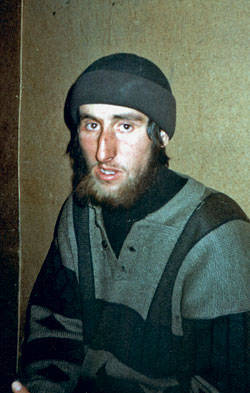
And so, having risen into the air, I directed the Su-25 from the Mi-8.
In the end, everything went well. Bombs caused avalanches on the right slopes, blocking militants in the gorge and cutting off their escape routes. They had no way back: everything was filled up with hundreds of tons of snow and ice. Without food, frostbitten, they sat at a height of several days. When trying to break through, we ran into our ambush fire. Then they split into two groups. One had to go to Georgia for help. The second, with wounded and frostbite, remained in the gorge. They saw how the special forces were squeezing the ring, and at night they went into the next gorge. Every day, the insurgents' ears demanded from us the General Staff. They shouted at us and said that we were “grunting with food for nothing”:
- A week for your operation, no more!
December 27 The first militant group ran into an ambush for border guards. Four bandits were killed. Three more “Leopard Gelaev” were captured. They preferred him death from bullets, hunger and cold. At the first interrogation, the prisoners told the FSB officers who we were hunting for. But I found out about it three days earlier.
December 24 captured Chechen militant Ali Magomadov. They took him Dagestan OMON. The Chechen was exhausted and frostbitten. We saved his life. He was not beaten, had medical aid and was treated to cigarettes and ... tangerines. The ones that they sent us from Khankala. Why such humanism? It was this militant who admitted that the commander of the gang that we drove through the gorges in Tsumad was a Chechen brigadier general Ruslan Gelayev. We reported on this to Kvashnin (at that time the Chief of the General Staff of the Armed Forces of the Russian Federation. - “RR”).
Kvashnin asked:
- Do you need anything?
And I asked Ka-27. This is a two-axle ship helicopter, which can rise up to three thousand meters. On board this turntable, you can land a reconnaissance group in a hang mode right on top of the ridge and give the scouts the opportunity to act from top to bottom, rather than climbing the rocks below.
The helicopter took off from the Black Sea Novorossiysk, but traveled to the Caspian Sea for three days. And we continued to work. Moreover, we found both climbing ropes, mountain boots, and Gortex jackets for the captured and killed militants. We just didn't have it. All that was sent to us at the end of the operation was lifting ropes. Due to the lack of equipment, we lost six people: they died on the rocks, falling into the gorge. The radio operator broke down, and his commander, Lieutenant Alexei Dergunov, climbed out to get him and fell after him. For me it was a terrible blow: Alexey is my graduate. Their corpses were collected for a long time, with the help of specialists from the Ministry of Emergency Situations of Dagestan. The last one was found to be a radio operator of scouts, already five days after the end of the operation.
And December 28 came to a close. The fighters of the Volgograd intelligence service noticed a small group of militants descending along a rock on a bundle of automatic belts. Thirst for fame prevented the scouts to report this to the CPSU. And they went to capture with one machine guns. The battle went on during the day, and I personally had to evacuate the wounded by helicopter, putting the car into the bed of the Andy Koysu river.
Chechens took refuge in a cave. It was impossible to go around them on the steep slopes, and they kept the bottom of the canyon under fire. Nevertheless, the scouts managed to destroy several militants, chained to the maneuver with mortar fire. Then ensign Igor Mokrushin distinguished himself. His mortar crew laid mines in 30 – 50 meters from their scouts. Mines were delivered to the high mountainous firing position on the donkeys by residents of the neighboring villages. In this battle, the seventh "two hundredth" appeared - in addition to the guys who broke on the rocks.
The next morning, three groups of special forces went to the area of the cave, and the battle broke out again. Helicopters of the Border Troops took off into the air, and I was on board one of them as the head of the All-Union Communist Party. What happened next, I have already told.
So the official statements of the press services claiming that Gelayev fatally wounded two soldiers of the FSB border guards who fell from gang guns in an unequal battle, after which the brigadier general amputated his arm, look somewhat unnatural.
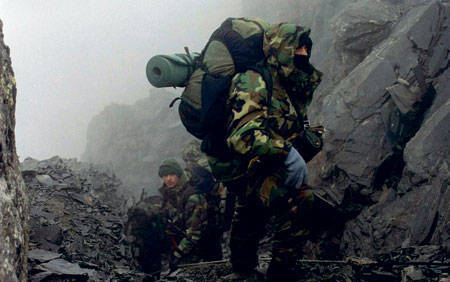
***
Together with Gelayev, twenty bandits were killed, nine surrendered. Spetsnaz lost seven. For this operation, Alexander Musienko was presented with the Hero Star, then they beat her to the Order For Services to the Fatherland 2 degree, they even tried to award her with a nominal weapon, but in the end they did not award anything. The commander of the special forces group, Aleksey Dergunov, was awarded the Gold Star posthumously. The colonel declared weak provision of mountain equipment and uniforms for our special forces groups, but ... only made powerful enemies at the top and in 2006 was forced to resign from the GRU. All the wars in Russia at that time “ended”.
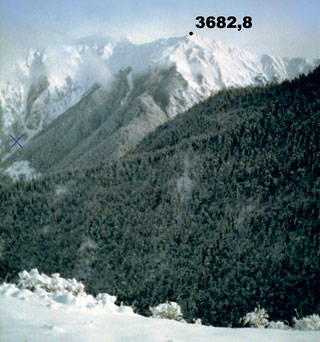
Information